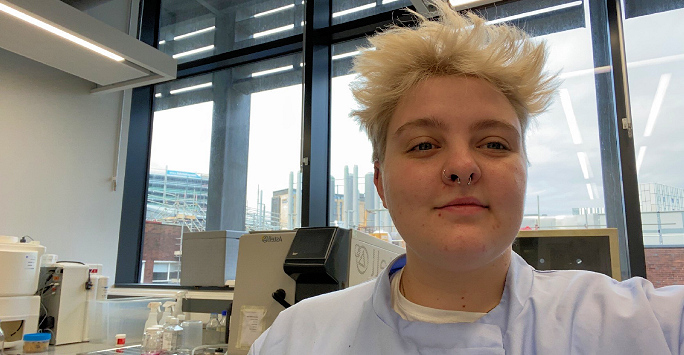
Beth Heaton, a PhD student in the department of Pharmacology and Therapeutics, has won an award at the annual British Pharmacological Society (BPS: Pharmacology 2020) conference for her work on glucose uptake transporters in human immune cells.
Beth’s poster, titled “Glucose uptake in immune cells is lower in the presence of HIV antiretrovirals due to interactions with SLC transporters - an in vitro/in silico investigation.”, gave an overview of her work examining how commonly used antiretrovirals can interact with glucose uptake transporters, termed GLUTs, resulting in lowered activation of immune cells.
“Glucose is used by immune cells as a power source, to provide the energy they need to perform a number of vital functions; from fighting infections to repairing damaged tissues. Glucose uptake transporters bring glucose into the cell so that it can be used by immune cells upon activation. As part of the work presented at BPS, we showed that some drugs can unintentionally inhibit this process, leading to less activation of the immune cells. Whilst we don’t yet know what the clinical implications of this may be, it is an important interaction that we’re currently trying to follow up.”
Following review and discussion by the review committee at BPS, Beth was awarded the Education Poster prize following the Pharmacology 2020 virtual meeting. Beth said “I was really pleased to have been awarded this prize for my work. It showed the results of my work over the past year or so and was my first conference during my PhD. I’m looking forward to continuing the work, investigating these interactions, and expanding it to look at how nanoparticles, and other engineered materials, may cause similar effects”.
Beth’s primary supervisor, Dr Neill Liptrott, said “I am extremely proud of Beth being awarded this prize; it is recognition of the fantastic work she has carried out over the past year or so; particularly during the recent lockdowns. It builds on our previously published work on the impact of small molecules on immune responses and fits well with our expanding work on immune interactions of engineered materials”.
Beth's PhD studentship is supported by a Horizon 2020 grant relating to developing infrastructures to support the translation nano-enabled medical technologies to clinical use.